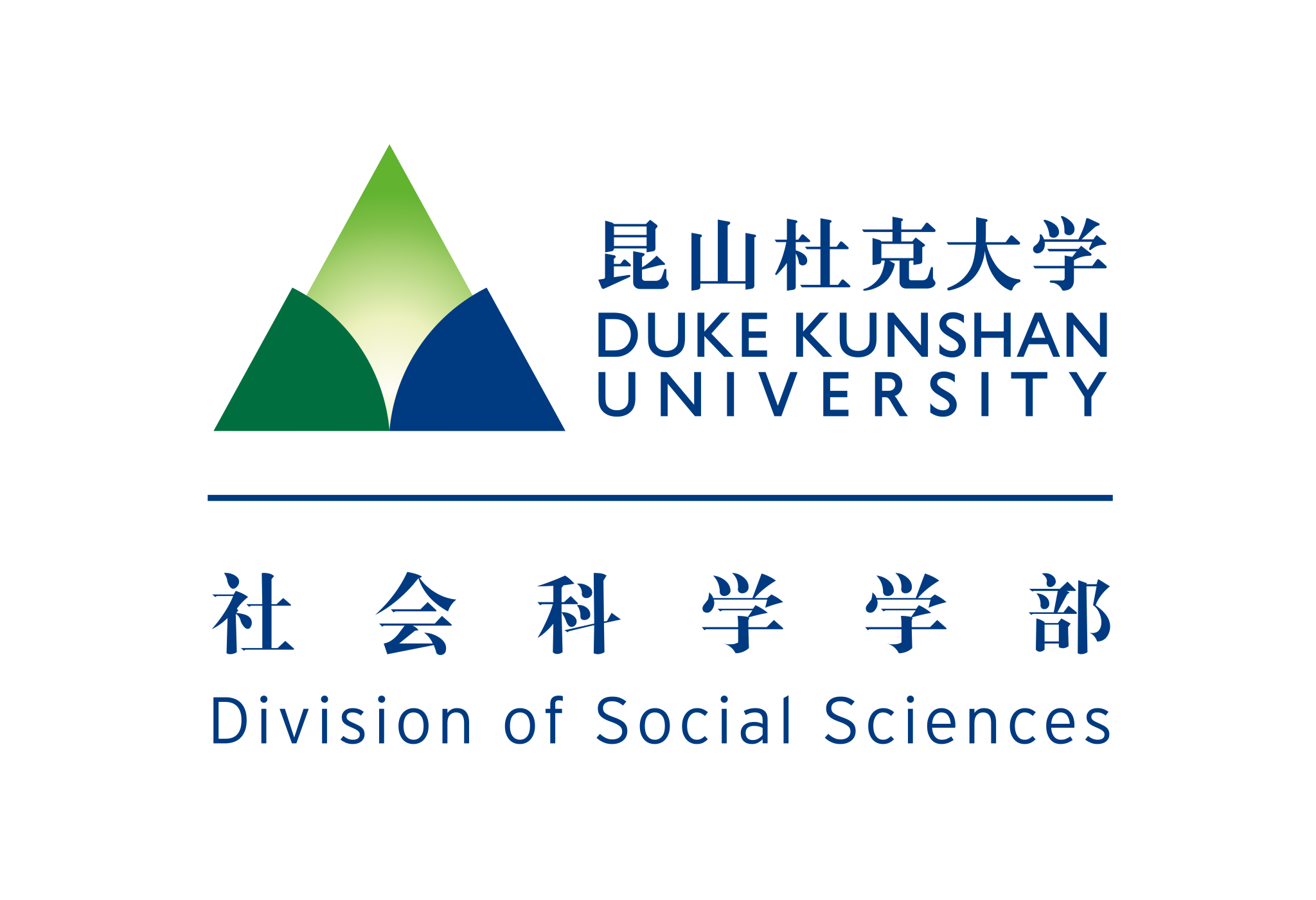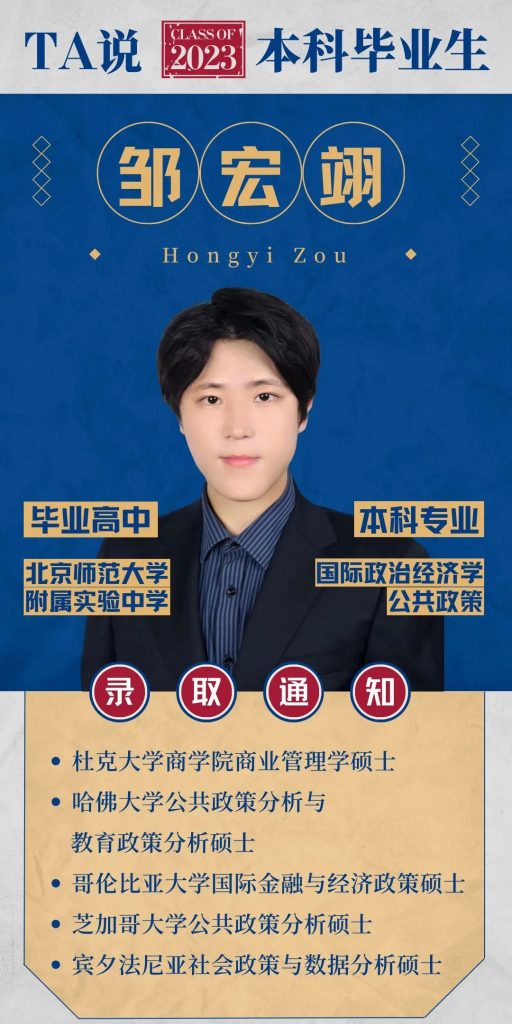
01 Stories About My Major And ME
I have always been concerned about social issues, and I am eager to put the beautiful vision of “making the world a better place” into practice. Therefore, economics, which is a hot subject in the traditional social context, has become the focus of my exploration after entering the university.
In the first-year Global Challenges Common course, we are asked to break away from the framework of a single discipline and integrate multidisciplinary knowledge to provide constructive solutions to specific global challenges. I chose to approach this from a public health perspective, providing public health service-based path dependence for poverty reduction in Zambia and neighboring regions in sub-Saharan Africa, and presented a proposed policy memorandum in collaboration with a Category 2 agency of the World Health Organization (WHO). This project made me realize that on the global stage, everyone, whether public or private, has the opportunity and ability to make a positive difference.
Next, in Dr. Ashton Merck’s Public Policy 101 course, we acted as different stakeholders in the public sphere and were deeply involved in the governance of public affairs in different contexts set by our professors. This established my great enthusiasm for the field of public policy, and I began to wonder what role public policy could play in different social contexts and problems.
Inspired by a series of courses and practical experiences, I gradually understood Dr. David Easton’s interpretation of the value of public policy, that is, the essence of public policy is “the authoritative distribution of social value”. In fact, public policy provides a “lever” to leverage relevant social resources in the society and guide the centralized flow of resources to the places where they are needed, so as to achieve qualitative changes in scale.
The determination of the social function of public policy gave rise to my idea of placing social issues in the framework of public policy to find solutions, thus determining the direction of further subdivision. I am very grateful to DKU for broadening my understanding with interdisciplinary and advancing with The Times classes, helping me find the precise entry point to practice my beautiful vision and promote social change as I wish.
02 Plans After Graduation
I plan to pursue a master’s degree in international finance and economic policy at Columbia University. After graduation, I will engage in related work of strategic consulting, providing strategic optimization and solutions for problems encountered by governments and enterprises. In the long run, I hope to work as a consultant in international financial organizations such as the World Bank Group (WBG), the International Finance Corporation or the International Monetary Fund in the future and make contribution to the economic development of developing countries.
03 Rich Internship Experience
For the past four years, internships have taken up most of my time outside of school because they are one of the best ways to quickly get out of the ivory tower and turn knowledge into skills. In order to enrich my knowledge as much as possible and prepare for the future, I did internships in both public and private organizations, including domestic government agencies, CICC, Deloitte Management Consulting, Boston Consulting Group, Roland Berger Management Consulting, linkedin China, UNESCO, and the United Nations Academic Impact Organization.
What impressed me most was my internship in Boston Consulting Group. As a consulting assistant, I participated in the formulation of brand management plans and feasibility assessment of joint venture projects of many American enterprises, during which I exercised my multi-dimensional abilities such as industry research, background investigation and valuation modeling. And I’m pleased that many skills developed at DKU are making a difference in the workplace. Interdisciplinary thinking, structured analysis, rapid learning, multi-tasking, and intercultural communication skills have all contributed to my productivity, expanded my social network, and won me recognition from experts and colleagues.
04 Interesting Cross-cultural Experience
In December 2020, the China-CEEC Spring Festival Gala was held in China, and several DKU students and I participated as volunteers.
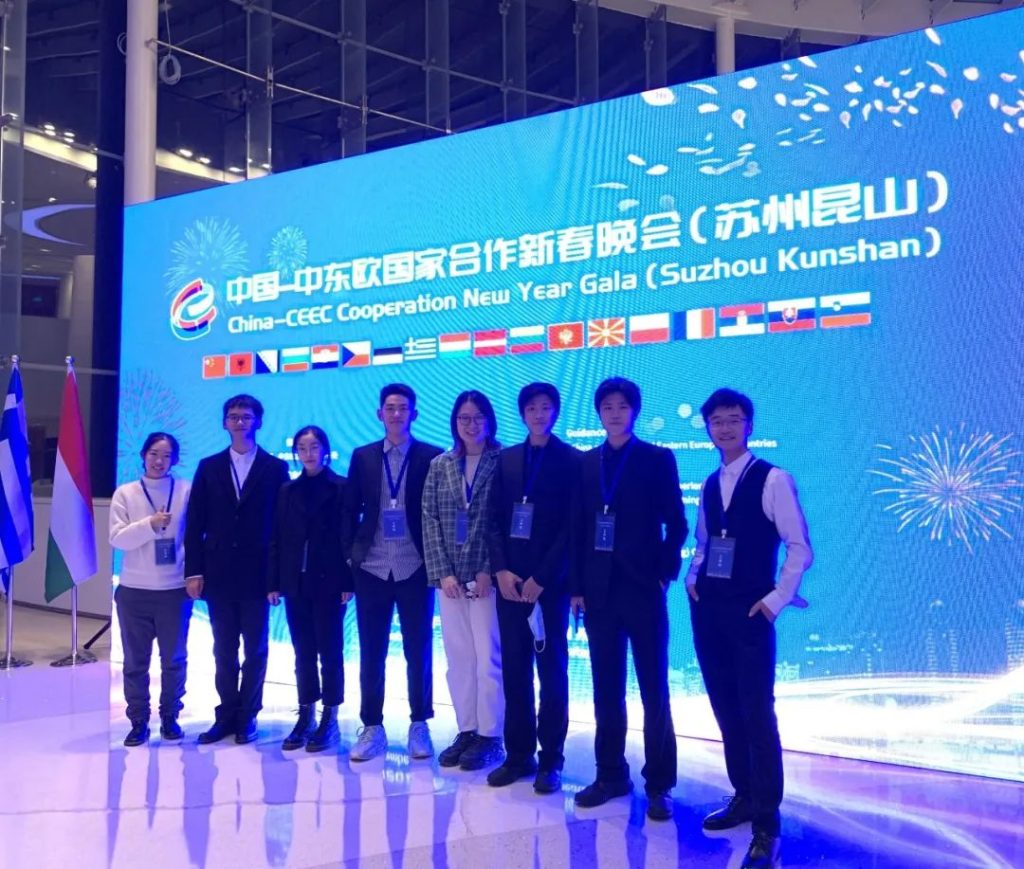
China-ceec cooperation scene
I had the honor to be the accompanying interpreter for Ms. Elizabeta Gjorgjieva, Ambassador of North Macedonia to China, and Ms. Vsena Andreevska, Political Counselor of North Macedonia. During the activity, I introduced Chinese culture to them and also got a glimpse of the charm of foreign culture from their words. During our conversation, Counselor Andreevska showed great interest in China. Before leaving, she said to me: “You are an excellent young Chinese man, full of enthusiasm and warmth, and China brings me the same feeling.” Her words made me feel the value of cross-cultural communication directly, and also realized the mission of being a “world citizen with the roots of national culture” more deeply. This is also one of the important driving forces for me to devote myself to international affairs governance and move towards a multicultural community.
Moreover, I am honored to serve as a campus trustee, responsible for connecting with millennial scholars from other countries. Student representatives from 30 countries, selected from 30,000 applicants from 140 countries around the world, gathered online to discuss the challenges and possible solutions posed by the Sustainable Development Goals. This is a feast of cross-cultural communication, which makes me feel the wisdom that human beings can contribute as a community and also strengthens my international development direction. Therefore, from the Oxford Scholars Forum to the Duke US-China Summit, from the United Nations Academic Impact GAC to the Asian GCED Development Committee, I have also fulfilled my commitment to myself through continuous cross-cultural practice.
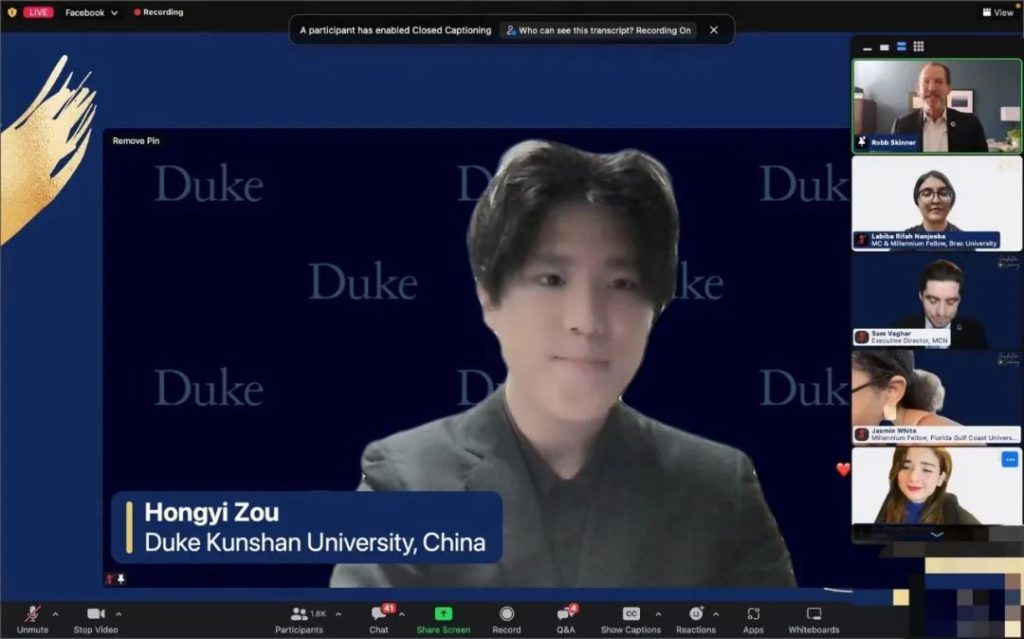
The Millennial Scholar Commencement address
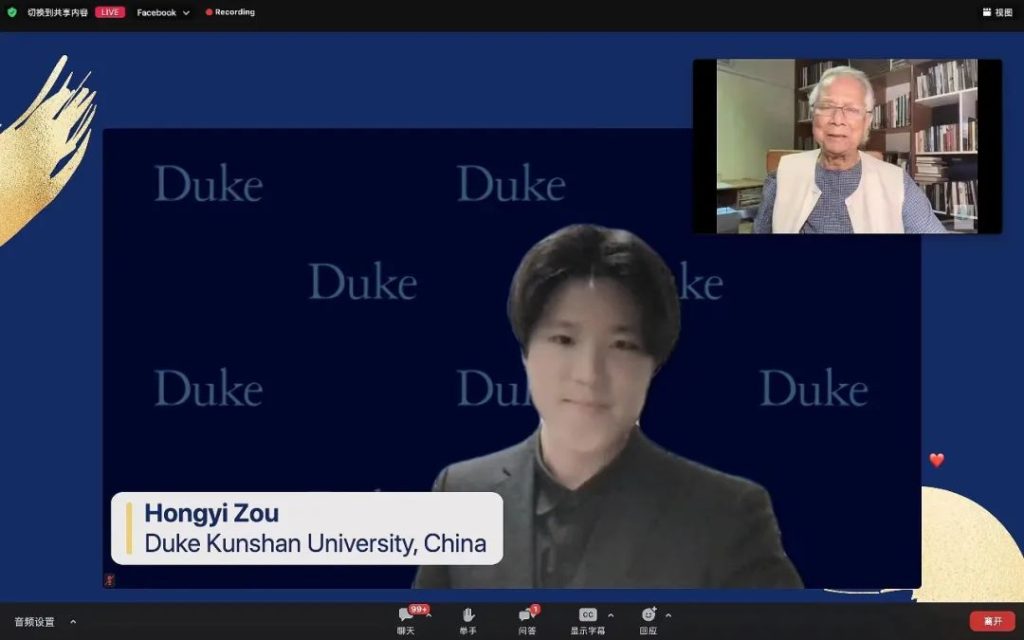
Shared the stage with Nobel Prize winner Dr. Muhammad Yunus
05 Striking Leadership Experience
In my sophomore year, I successfully applied to become a Resident Assistant, dedicated to creating a warm and belonging living space for students on my floor. Before a final exam, we held a themed activity called IKEBANA (Art of flower arrangement), which prepared dozens of dried flower/herbal materials and decorative materials such as lacquer for students from different countries to make flower arrangements according to their own aesthetic preferences. The “beauty” of flower arrangement art has no fixed paradigm, just like the diverse culture and growing background. We designed this event to allow people to release their unique personal styles and learn to understand and appreciate each other’s differences.
In addition to flower arrangement, I also planned many interesting community activities together with other RA, including handmade DIY activities such as freshman salon and sand painting creation, as well as multi-cultural activities such as charity market and cross-cultural banquet, as well as activities to help people relieve pressure and popular science education. As long as people are willing to get out of their rooms, accommodation is never boring. In the process of designing activities and communicating with students from different cultural backgrounds, I also learn to respect individual differences, maintain physical and mental health, and promote community growth.
06 Why Love DKU?
DKU’s innovative class is one of the important reasons I fell in love with her. Our classes can be on the lawn or by the lake. You might see a half-dozen students and professors from different countries sitting around the water pavilion, drinking coffee and discussing welfare economics. You may also see professors and students in the Academic Building’s auditorium, playing the role of local governments and NGO, conducting policy debates. These are DKU’s class that cannot be defined by any paradigm.
I have experienced unprecedented freedom here, and this is because the school treats each student as an individual with the highest degree of respect. In the Public Policy 101 class, we can enjoy a simulated policy game designed by Dr. Ashton Merck and win prizes she made. In the class of Political Economy 302, Dr. Zhaojin Zeng will kindly bring coffee and breakfast because our class time is too early. After academic English, Professor Kevin Sprague invited all the students to have authentic Jiangnan hot pot. In the class of Public Policy 309, Dr. Fangsheng Zhu offered a separate combination of online and offline teaching for students who could not attend the class. Only in DKU, a truly “student-centered” campus, could I receive Dr. Nikolas Kirby’s blessing to students on Thanksgiving Day, Professor Jason Todd’s advice after class to help me improve my research project, and Dr. Jaehee Choi’s career planning experience sharing based on his own experience…
Too many details support my love for this utopian campus, which exists like a dream but is real.
07 Key Words During 4-years Undergraduate
I like to use the image of “water” to describe the phased changes in my four years at DKU:
The first year is a “pool”, because I have set limits on myself.
The second year is a “stream”, because I realize that the place is surrounded by mountains.
The third year is “trench”, because of the clear direction, lingering between the professional gully and vertical.
The fourth year is “ocean”, because walking in the past, you can stand alone, the mountains and rivers.
08 Suggestions To Fellow Students
The haze of the epidemic has gradually dissipated, and I hope that the students can try their best to broaden their boundaries in the limited four years, experience diverse cultures, accept fresh views, and dare to master their own voice in the international context. “Receive the light in the court and see one hall, receive the light in the world and shine on the four sides.” As a global citizen, there is peace of mind in promoting positive change within your power.
Translated and Edited by Zhenyu Tian, Class of 2027
